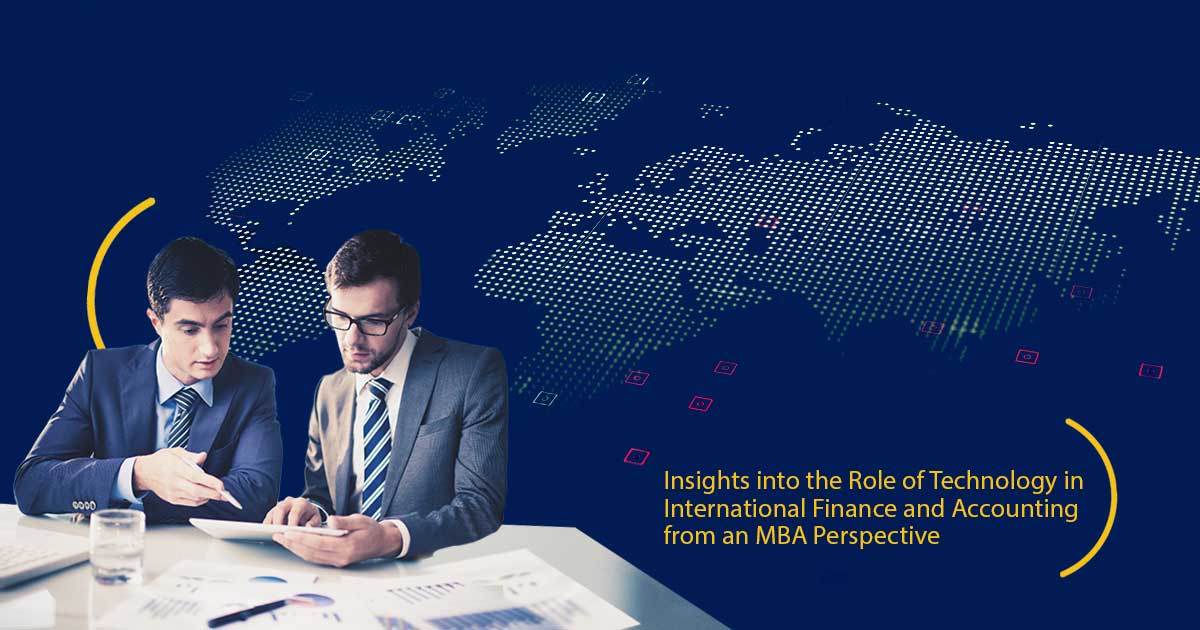Insights into the Role of Technology in International Finance and Accounting from an MBA Perspective
05 Feb 2024

Insights into the Role of Technology in International Finance and Accounting from an MBA Perspective
Over the years, the widespread adoption of technological solutions has become a common trend across various industries, with financial services being no exception. Financial organisations, in their quest for enhanced efficiency, speed, and improved customer experiences, have continually sought out emerging technologies. Similarly, the accounting profession has undergone significant evolution since its inception nearly five millennia ago. Initially reliant on manual bookkeeping methods, recent advancements in accounting technology have revolutionised the profession. Tasks that once took weeks can now be accomplished in minutes, freeing up finance professionals and accountants from tedious responsibilities and providing them with increased freedom, responsibility, and time.
To address the evolving needs of the business landscape, MBA programmes are increasingly incorporating technology concepts into their curriculum. As companies expand their operations across borders, MBA students should learn the intricacies of financial management in diverse and complex international settings. Technology plays a pivotal role in this context, offering tools and systems that streamline cross-border transactions, facilitate real-time financial reporting, and ensure compliance with varying international accounting standards. Today, we shall explore the role of technology in international finance and accounting from an MBA perspective:
Big Data and AI
In international finance and accounting, big data encompasses vast amounts of both structured and unstructured data acquired by banks and financial institutions from online platforms. Artificial intelligence and machine learning systems are deployed in financial services for tasks like risk assessment and fraud detection. This technology proves valuable in areas such as AI-driven support, predictive analytics, reverse ETL applications and personalised experiences. MBA curricula are evolving to incorporate cutting-edge concepts in response to the dynamic landscape of the business world.
Cloud-based Solutions
Traditional accounting software is typically installed on individual devices, whereas cloud-based solutions are hosted on third-party servers. Accountants access these applications through web browsers, and all data is automatically stored and backed up in the cloud. This approach is also known as cloud computing. MBA students learn how companies can optimise costs by subscribing to these services instead of investing in costly IT systems and dedicated maintenance teams. Practical assignments include collaborative work on mobile devices that illustrates the real-world applications of this technology.
Blockchain and Cryptocurrencies
Blockchain technology has propelled a new digital era in finance, fortifying the entire financial technology ecosystem. MBA students explore its role in fortifying the financial technology ecosystem, leading to the development of cryptocurrencies like Bitcoin and Ethereum. The curriculum explores how these digital assets serve as powerful tools for wealth management. Students learn about the transformation of traditional financial transactions into transparent processes, contributing to the democratisation of the financial landscape.
Machine Learning
Machine learning uses algorithms to create models that autonomously process and analyse vast amounts of data. Accountants leverage machine learning to collect, manage, and process extensive data sets that would be impractical for manual analysis. For example, machine learning models can rapidly analyse millions of financial transactions and make predictions using real-time data. MBA students explore how machine learning enables accountants to handle extensive data sets that would be impractical for manual analysis.
Accounting Software
Over the years, software vendors have developed numerous accounting programmes, including FreshBooks, NetSuite ERP, and A2X. These tools assist in tasks such as budgeting, generating financial statements, managing inventory, paying taxes, processing payroll, and recording financial transactions. MBA students explore the advantages of these applications over manual bookkeeping, such as enhanced control over financial records, improved data accuracy, and security. Moreover, MBA curricula highlight the analytics and financial forecasting capabilities embedded in many tools, empowering businesses to make informed decisions.
Robo-advisory Services
Technological advancements in financial services have given rise to robo-advisory services. Robo-advisory services are introduced in MBA curricula, highlighting the emergence of digital investment and wealth management providers. Students explore how algorithms are deployed to provide clients with cost-effective and accessible investment advice. The curriculum underscores the benefits of robo-advisory services, such as optimal asset allocation and maintenance of lucrative investment portfolios at affordable fees and minimal effort, aligning with the technological advancements in financial services.
Predictive Analysis
As the name implies, predictive analysis aims to forecast the future using historical data and past outcomes. Accountants employ predictive analytics to forecast upcoming expenditures, create accurate budgets, estimate future sales, and identify areas for company expansion. MBA students explore how predictive analysis plays a pivotal role in strategic planning by utilising historical data to identify potential risks and uncertainties. This proactive approach empowers businesses to implement risk mitigation strategies and prepares them for various unforeseen circumstances.
Final Thoughts
In conclusion, the integration of technology into international finance and accounting within MBA programmes is not merely an academic pursuit but a strategic imperative. As the business landscape evolves, technology becomes the catalyst for efficiency, innovation, and strategic decision-making. The diverse array of technological concepts explored, from big data and AI to blockchain and predictive analysis, underscores the profound impact technology has on reshaping financial landscapes globally. MBA programmes aim to prepare their students to become future business leaders, navigating this tech-driven era with adequate skills and knowledge of international financial management. The seamless incorporation of cutting-edge concepts reflects a commitment to staying ahead of industry trends, fostering adaptability, and ensuring students are well-positioned to drive innovation and success in the ever-evolving field of finance and technology.
Recent Blogs
06 Jan 2025
13 Jan 2025
20 Jan 2025